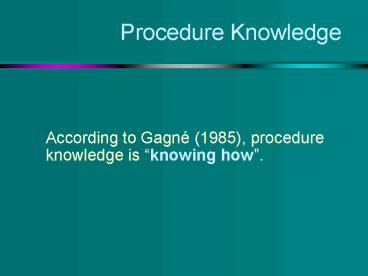Procedure Knowledge - PowerPoint PPT Presentation
1 / 13
Title:
Procedure Knowledge
Description:
Using a procedure refers to applying an ordered set of actions to achieve a goal. ... by describing either natural or volitional responses to those circumstances. ... – PowerPoint PPT presentation
Number of Views:38
Avg rating:3.0/5.0
Title: Procedure Knowledge
1
Procedure Knowledge
- According to Gagné (1985), procedure knowledge
is knowing how.
2
Procedure Knowledge
- Using a procedure refers to applying an ordered
set of actions to achieve a goal. There is often
more than one procedure for achieving a given
goal. A procedure is sometimes referred to as a
technique, skill, or method. A procedure can be
either a mental process or a physical skill.
Most procedures are a combination of mental and
physical activities. - Leshin, Pollock, Reigeluth (1992). p. 170
3
Outcomes
- The ability to state the steps in a procedure is
usuallyDeclarative Knowledge. - The ability to execute a procedure is an
Intellectual Skill (rules).
4
Characteristics of Procedure Knowledge
- A sequence of actions.
- An algorithm.
- May include physical and/or mental processes and
activities. - May involve decision points(for complex
procedures). - Ultimately, we are interested in automaticity
(unconcious skill).
5
Strategies for Instruction
- Expository approach.
- Present, demonstrate, practice(Tell, show, do)
- Most common strategy
- Inquiry approach
- Observe, experience, exploreand/or trial and
error - form and test hypotheses
- Useful in only certain cases. When?
6
Specific Instructional Techniques
- Simplify and build to greater complexity
- Part-whole, whole-part(distributed vs massed
practice) - Components to be practiced
- Determine if procedure is required
- Complete each step in the procedure
- List the steps
- Self-check the procedure
7
Specific Instructional Techniques
- The role of job aids?
- What to do about errors when practicing the
procedure?
8
Principle Knowledge
- Principles are relational rules. They can often
be expressed in the form of if-then or
cause-effect statements.
9
Principle Knowledge
- Principle knowledge may help us to predict,
explain, or control circumstances in our
environment by describing either natural or
volitional responses to those circumstances. - Smith Ragan (1999)
10
Outcomes
- The ability to state a principle is usually
Declarative Knowledge. - The ability to use or implement a principle is
anIntellectual Skill (higher-order rules).
11
Characteristics of Principle Knowledge
- variables, concepts, contexts, conditions
- relationships among all these factors(if-then
kinds of connections) - identifying situations or conditions in which the
principle is applicable (diagnosis) - judgment, heuristics, rules-of-thumb
- usually combinations of many procedures
12
Strategies for Instruction
- General strategy
- inquiry approach
- expository approach.
13
Specific Instructional Techniques
- Explain why?
- Examples, divergent cases
- Easy-to-difficult
- Concept maps
- Practice different components
- State the principle.
- Recognise relevant situations.
- Use principle to predict, explain, control.
- Self-check to see if principle was correctly
applied.































